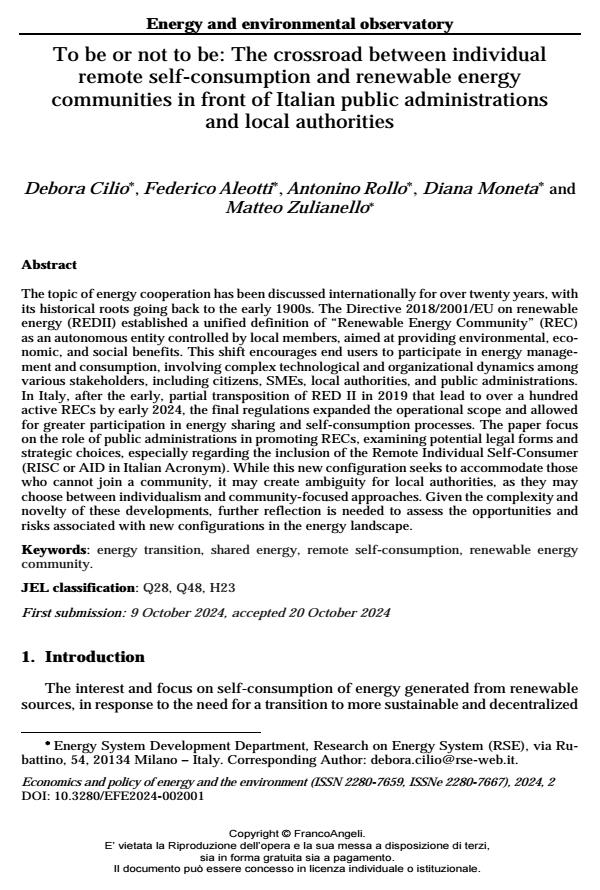To be or not to be: The crossroad between individual remote self-consumption and renewable energy communities in front of Italian public administrations and local authorities
Journal title ECONOMICS AND POLICY OF ENERGY AND THE ENVIRONMENT
Author/s Debora Cilio, Federico Aleotti, Antonino Rollo, Diana Moneta, Matteo Zulianello
Publishing Year 2024 Issue 2024/2
Language English Pages 31 P. 5-35 File size 473 KB
DOI 10.3280/EFE2024-002001
DOI is like a bar code for intellectual property: to have more infomation
click here
Below, you can see the article first page
If you want to buy this article in PDF format, you can do it, following the instructions to buy download credits

FrancoAngeli is member of Publishers International Linking Association, Inc (PILA), a not-for-profit association which run the CrossRef service enabling links to and from online scholarly content.
The topic of energy cooperation has been discussed internationally for over twenty years, with its historical roots going back to the early 1900s. The Directive 2018/2001/EU on renewable energy (REDII) established a unified definition of “Renewable Energy Community” (REC) as an autonomous entity controlled by local members, aimed at providing environmental, economic, and social benefits. This shift encourages end users to participate in energy management and consumption, involving complex technological and organizational dynamics among various stakeholders, including citizens, SMEs, local authorities, and public administrations. In Italy, after the early, partial transposition of RED II in 2019 that lead to over a hundred active RECs by early 2024, the final regulations expanded the operational scope and allowed for greater participation in energy sharing and self-consumption processes. The paper focus on the role of public administrations in promoting RECs, examining potential legal forms and strategic choices, especially regarding the inclusion of the Remote Individual Self-Consumer (RISC or AID in Italian Acronym). While this new configuration seeks to accommodate those who cannot join a community, it may create ambiguity for local authorities, as they may choose between individualism and community-focused approaches. Given the complexity and novelty of these developments, further reflection is needed to assess the opportunities and risks associated with new configurations in the energy landscape.
Keywords: energy transition, shared energy, remote self-consumption, renewable energy community.
Jel codes: Q28, Q48, H23
Debora Cilio, Federico Aleotti, Antonino Rollo, Diana Moneta, Matteo Zulianello, To be or not to be: The crossroad between individual remote self-consumption and renewable energy communities in front of Italian public administrations and local authorities in "ECONOMICS AND POLICY OF ENERGY AND THE ENVIRONMENT" 2/2024, pp 5-35, DOI: 10.3280/EFE2024-002001